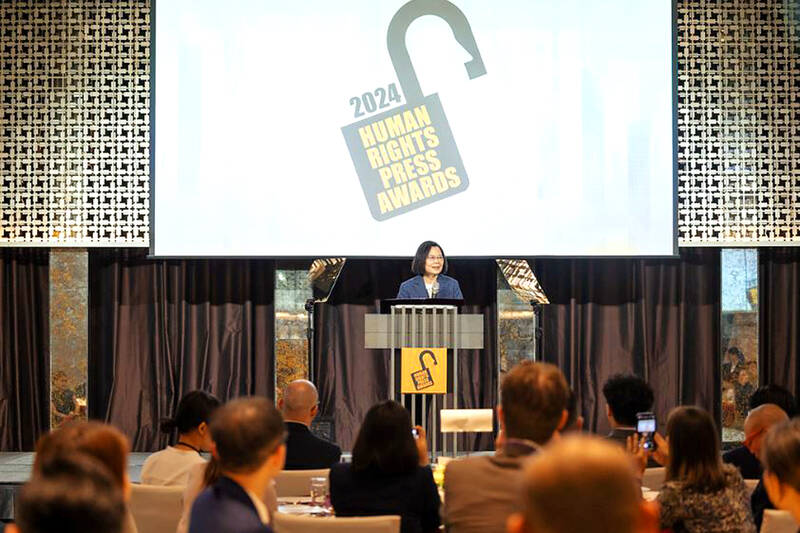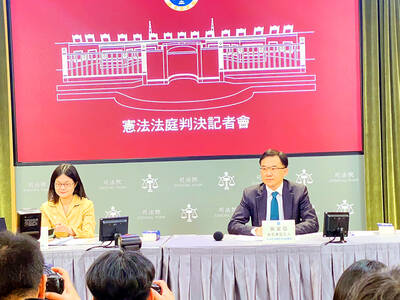The Human Rights Press Awards for Asia yesterday hosted its annual ceremony in Taiwan for the first time, celebrating journalism and human rights in a nation ranked best in Asia for press freedom.
Taiwan boasts freedom of the press and has become an important hub for international media, being home to 176 correspondents from 86 media outlets from 22 countries as of last month, President Tsai Ing-wen (蔡英文) said at the event in Taipei.
However, authoritarian regimes are constantly attempting to influence the nation’s media environment and democracy, and polarize Taiwanese society through disinformation campaigns and propaganda, Tsai said.

Photo: Screen grab from the Presidential Office’s Flickr page
It takes all sectors of society to act together to combat disinformation with timely and transparent clarification, research on authoritarian information manipulation and media literacy lessons, she said.
“Taiwan will continue to stand up for democracy, freedom and human rights,” she said.
Taiwan Foreign Correspondents’ Club president Thompson Chau (周浩霖) called on the government to “remain committed to press freedom, provide more access and ease regulations on foreign media workers.”
The winners and runners-up this year were announced on Thursday last week — to mark World Press Freedom Day the following day.
The organizers — Human Rights Watch, the Walter Cronkite School of Journalism and Mass Communication at Arizona State University, the Reynolds Center for Business Journalism, and the foreign correspondents’ clubs in Taiwan and Thailand — present the awards to “increase respect for people’s basic rights and to focus attention on threats to those freedoms.”
The awards were given in seven categories: Investigative Writing (English), Investigative Writing (Chinese), Photography, Multimedia, Documentary Video, Podcast and Newsroom in Exile, with the final two being new additions this year.
Winners included the Guardian , which earned the Investigative Writing (English) award for its reporting on alleged trafficking of workers at Amazon.com warehouses in Saudi Arabia; and Singapore-based Initium Media, which won the Chinese-
language award; and al-Jazeera, which won in the Multimedia category for its “If I die, I die: Pakistan’s death-trap route to Europe” report.
Zan Times and Frontier Myanmar — which was also honored in the Podcast category — won in the Newsroom in Exile category for their “Despair is settling in: Female suicides on rise in Taliban’s Afghanistan” and “Religious minorities persecuted in Myanmar” reports.
In the Photography category, Agence France-Presse won for its images of women fighting Myanmar’s junta.
In the Documentary Video category, BBC Chinese and Deutsche Welle were recognized for their films on anti-extradition bill protesters in Hong Kong and an elite police unit in Bangladesh.
“In an era in which rising authoritarianism generates autocratic leaders and mass disinformation, the role of journalists in exposing the truth is more critical than ever,” Human Rights Watch executive director Tirana Hassan said.
Many winners “are examples of brave journalism from Afghanistan, Hong Kong and Myanmar, places where reporting has become increasingly difficult and dangerous,” Chau said, adding that “Taiwan is an extraordinary place for a growing number of Asia-focused correspondents to live and work.”

The US government has signed defense cooperation agreements with Japan and the Philippines to boost the deterrence capabilities of countries in the first island chain, a report by the National Security Bureau (NSB) showed. The main countries on the first island chain include the two nations and Taiwan. The bureau is to present the report at a meeting of the legislature’s Foreign Affairs and National Defense Committee tomorrow. The US military has deployed Typhon missile systems to Japan’s Yamaguchi Prefecture and Zambales province in the Philippines during their joint military exercises. It has also installed NMESIS anti-ship systems in Japan’s Okinawa

TRAGEDY STRIKES TAIPEI: The suspect died after falling off a building after he threw smoke grenades into Taipei Main Station and went on a killing spree in Zhongshan A 27-year-old suspect allegedly threw smoke grenades in Taipei Main Station and then proceeded to Zhongshan MRT Station in a random killing spree that resulted in the death of the suspect and two other civilians, and seven injured, including one in critical condition, as of press time last night. The suspect, identified as a man surnamed Chang Wen (張文), allegedly began the attack at Taipei Main Station, the Taipei Fire Department said, adding that it received a report at 5:24pm that smoke grenades had been thrown in the station. One man in his 50s was rushed to hospital after a cardiac arrest

ON ALERT: Taiwan’s partners would issue warnings if China attempted to use Interpol to target Taiwanese, and the global body has mechanisms to prevent it, an official said China has stationed two to four people specializing in Taiwan affairs at its embassies in several democratic countries to monitor and harass Taiwanese, actions that the host nations would not tolerate, National Security Bureau (NSB) Director-General Tsai Ming-yen (蔡明彥) said yesterday. Tsai made the comments at a meeting of the legislature’s Foreign Affairs and National Defense Committee, which asked him and Minister of National Defense Wellington Koo (顧立雄) to report on potential conflicts in the Taiwan Strait and military preparedness. Democratic Progressive Party (DPP) Legislator Michelle Lin (林楚茵) expressed concern that Beijing has posted personnel from China’s Taiwan Affairs Office to its

‘ILLEGAL RULING’: The KMT and the TPP slammed the Constitutional Court judgement, saying it contravened the law and was trying to clear the way for a ‘green dictatorship’ The Constitutional Court yesterday ruled that amendments to the Constitutional Court Procedure Act (憲法訴訟法) passed by the Legislative Yuan last year are unconstitutional, as they contravene due legislative process and separation of powers. The Legislative Yuan on Dec. 20 last year passed amendments stipulating that no fewer than 10 grand justices must take part in deliberations of the Constitutional Court, and at least nine grand justices must agree to declare a law unconstitutional. The Executive Yuan on Jan. 2 requested that lawmakers reconsider the bill, but the Legislative Yuan, under a combined majority of Chinese Nationalist Party (KMT) and Taiwan People’s Party